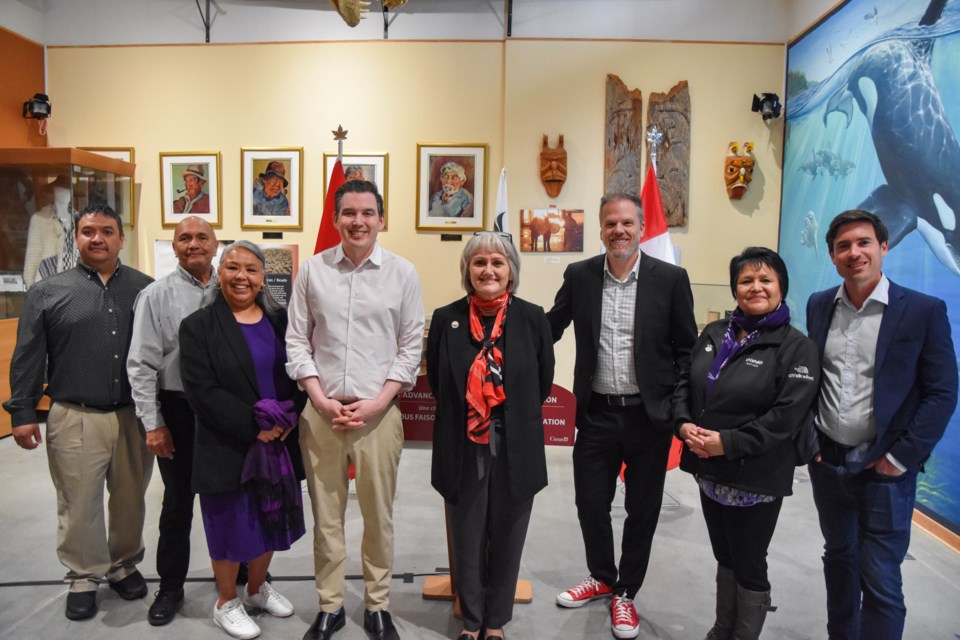Over $4 billion of this year's federal budget will go towards advancing Indigenous reconciliation.
shíshálh Nation lhe hiwus yalxwemult (Chief Lenora Joe) and hihewus (councillors) were joined by Terry Beech, Minister of Citizen Services; Mark Holland, Minister of Health and Patrick Weiler, MP for West Vancouver–Sunshine Coast–Sea to Sky Country on April 23 at the tems swiya Museum to highlight measures of this year's budget that will have a significant impact for Indigenous communities.
Weiler remarked how important it was to be in Sechelt for the announcement. “shíshálh Nation has long been a leader, becoming the first self-governing nation in Canada and across Turtle Island, and really being a leader on measures on moving forward reconciliation.”
“Indigenous people face health outcomes far worse than other Canadians, we must take sustainable steps forward to address the crisis,” said yalxwemult. “Many Indigenous people including shíshálh people do not have access to basic health care such as doctors and nurses.
“Indigenous people in Canada, are the fastest growing population or country and traditionally have been amongst the most impoverished, which means the greatest economic opportunity that we have in this generation is to ensure the future success of Indigenous people in our country,” said Beech.
Looking at the numbers
Since 2015, the federal government has invested over $200 billion on the path to reconciliation, Beech said, adding that the partnership and commitment continue in 2024’s budget.
- $243 million has been allocated to support post-secondary education, adding to the 2019 commitment to fund $487.5 million over the next 10 years.
- $918 million has been allocated to fund Indigenous housing and infrastructure, adding to over $5 billion in individual housing programs. Of this, $426 million is designated for Indigenous people living on reservation land, $62 million for self-governing and modern treaty First Nations, 270 million for anyone communities and 60 million for Métis communities, Beech explained.
- $1.8 billion is allocated to family services, helping Indigenous communities exercise their jurisdiction under acts respecting First Nations, Inuit and Métis Children, Youth and Families.
“Every day, more Indigenous communities are reclaiming jurisdiction over Child and Family Services. This new investment brings our total investment in Indigenous children to $29 billion,” said Beech.
Speaking to culture, Beech said that $290 million has been invested to “reclaim, revitalize and strengthen Indigenous culture and livelihoods.”
The annual commitment to Indigenous communities has also increased to $32 billion, nearly triple where it was eight years ago.
Minister Holland spoke to healthcare and said that the government has signed 26 new agreements with Indigenous communities throughout the country to build a better health system. $1.1 billion has also been invested into healthcare, with $630 million to improve access to mental health, he said.
Holland highlighted that racism still exists within Canada’s healthcare system, which can discourage people from seeking medical help. $168 million is going towards Joyce’s Principal, which aims to guarantee all Indigenous people the right of equitable access, without any discrimination, to all social and health services, as well as the right to enjoy the best possible physical, mental, emotional and spiritual health.
Holland said that these changes will take place immediately and that over the next several weeks direct announcements at community levels should occur.
“Removing systemic barriers is not something that you can just flip a switch on after 150 years,” said Beech. “But we are committed to walk this road and ensuring better outcomes for Indigenous families and future generations of Indigenous youth.”
Jordan Copp is the Coast Reporter’s civic and Indigenous affairs reporter. This reporting beat is made possible by the Local Journalism Initiative.



